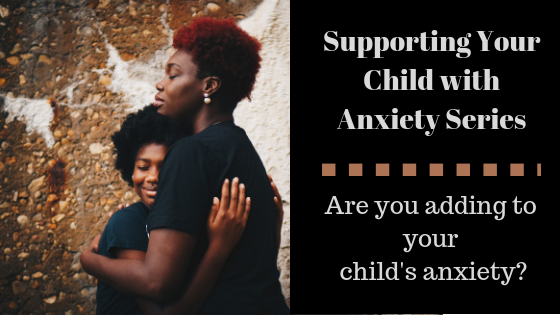|
Anxiety in children can take many different forms and come from many different sources. But are you adding to your child's anxiety? This article is NOT intended to blame or shame any parent. If you are reading this it's because you truly care and are concerned about your child. This article is intended to get parents to think of new ways to approach anxiety in their children.
Here are some possible ways you may be contributing to your child's anxiety: Setting unrealistic expectations- Expectations are important to ensure your child is motivated and successful. They can however cause a great deal of anxiety if they are unrealistic or presented in a way that is threatening. It is important to remember that every child is different so the expectations for each of your children may not be the same. For instance, one child may be a gifted athlete, another may not be athletic. You cannot expect the same level of athletic performance from both children. Catering the expectations to be achievable is important. Parents should also discuss expectations in a supportive, non threatening way. To clarify, you can threaten a punishment if your child does not meet the expectation of completing their homework or chores. However putting extra pressure on your child to be the best will create additional performance anxiety and may cause emotional issues if they do not succeed. Overreacting- If you tend to react in an outwardly emotional way, your child may learn to react in much the same way or experience anxiety when approaching you with a problem. For example, if you have several things going on at once and your child is tries to get your attention. You may yell at them to leave you alone. Then you continue your tasks, slamming things around, complaining aloud and making comments about how stressed you feel, we are teaching our child how to handle stress through our reactions. So when your child feels stressed, they may react is similar ways. Typically, when our kids are slamming things and screaming, we yell at them to stop and expect better behavior. Inevitably, this will create additional tension and anxiety for everyone in the house. Instead of negatively reacting when stressed consider deep breathing or mindfulness. You can also consider taking a “parent time out” by giving yourself a few minutes to calm down before you react to a situation. This will not only set a positive example but help you handle your own anxiety levels. Dismissing or avoiding your child's anxiety- Anxiety does not go away if we ignore it. It also does not get worse if we talk about it. It's important to discuss your child’s feelings. When your child is experiencing anxiety, being reassuring is not the best response. Being empathetic and discussing their feelings, fears, and realities is important. Anxiety is often fears about the “what if’s”. Help your child see the reality of situations and focus on the present. Not exploring feelings with your child- Feelings are scary, but being alone in your feelings is even scarier. Many times, especially in young children, feelings get confusing. When this happens, children can mistake certain feelings for anxiety. For example, before a performance, children may have feelings of anxiety. Talking them through the feelings excitement and nervousness can help connect your child to their feelings. Further conversations about how our bodies react in stressful situations can help children understand their feelings and deal with anxiety by understanding their bodies reactions. Parenting is hard. Parenting a child with anxiety can be extremely difficult. When thinking about how to help our child deal with anxiety, one area we need to consider is whether we are inadvertently contributing to their anxiety. If so, think about ways you can change to encourage positive change for your child and their anxiety.
0 Comments
|
AuthorAmanda Be, LMSW, MBA is owner and counselor at Supportive Counseling Services in Grosse Pointe, MI. Amanda has been a practicing clinical social worker since 2005. She is passionate about helping others lead happier, more successful lives through her private practice, advocacy and volunteer work. Amanda’s main objective is to support others during life’s challenges and hopes these blogs will help. She writes and speaks on topics for parents, counselors and educators. Archives
March 2020
Categories
All
|

 RSS Feed
RSS Feed